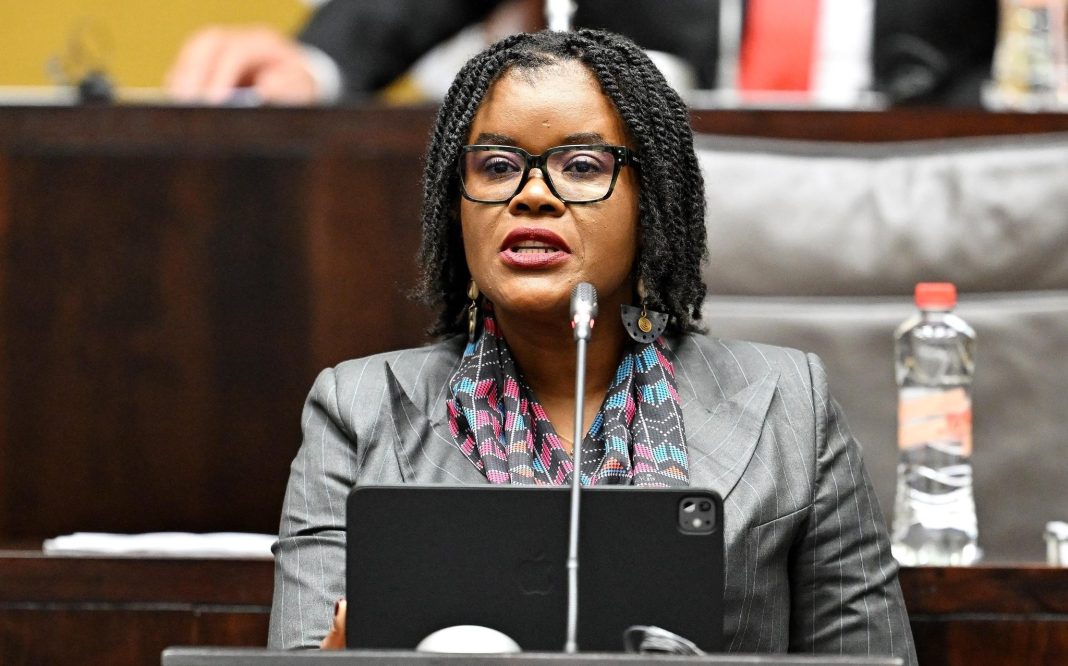By Johnathan Paoli
Higher Education and Training Minister Nobuhle Nkabane has maintained her vision for transforming the higher education system in an urgent governmental drive to ensure increased assistance to students and securing solutions for the unemployed youth of the country.
Nkabane presented her department’s R142.4 billion budget for the 2025/26 financial year to the National Assembly, pledging to build an inclusive, responsive and transformative post-school education and training (PSET) system.
“This is a budget of hope, inclusion and transformation. With the review of and statutory amendments in the PSET, we hope to improve the efficiency and performance of the Post-School Education and Training System,” Nkabane said.
She noted that allocations would rise to R150 billion in 2026/27 and R158 billion by 2027/28, but warned that real-term growth remained insufficient to fully meet growing demand.
Nkabane opened her address with a tribute to individuals who recently died in higher education spaces, including Walter Sisulu University student Sisonke Mbalekwa, who was shot during a protest, and deputy vice-chancellor Sinethemba Mpambane.
The budget includes R96 billion for universities, R14 billion for TVET colleges; R48.7 billion for NSFAS and and R26 billion for SETAs and the National Skills Fund.
Despite this, universities face a R1.4 billion shortfall, which the department is addressing with the National Treasury.
TVET colleges remain central to the department’s strategy, with centres of specialisation expanded from 43 to 53, producing over 5000 artisans with a 97% pass rate.
New specialisations include mining, water utility, music and performing arts, while trade test centres increased to 37, and hairdressing has been added as a funded programme.
In terms of university expansion and infrastructure development, key projects include a new Tshwane University of Technology campus at Giyani (2026 enrolments); Phase One of North-West University’s Mining Campus (completion by 2030); and two new CET colleges in Gauteng and Northern Cape.
NSFAS funding has grown from R21.4 million in 1991 to R54 billion in 2024, with an additional R3 billion over three years via the National Skills Fund, supporting the “missing middle”.
Nkabane reaffirmed the goal of training 30,000 artisans by 2030 and highlighted ongoing collaboration with the Presidential Youth Employment Intervention.
To streamline student access, the Central Application System Bill has been approved by Cabinet and will soon go before Parliament.
Deputy Minister Mimmy Gondwe described the budget as a “catalyst for empowerment”, stressing its role in breaking intergenerational poverty and youth unemployment.
Gondwe cited the need for efficiency, especially at NSFAS, and referenced oversight visits conducted in all nine provinces.
“The legacy of June 1976 obliges us to ensure that young people today are not left behind. We inherited a sector marked by dysfunction,” she said, noting poor communication and delayed disbursements.
She highlighted partnerships with Microsoft, Takealot, Shoprite and others aimed at bridging education and employment, especially in rural institutions.
Agreements with SETAs are also being finalised to support transitions from learnerships to permanent work.
On student accommodation, Gondwe welcomed the R1.2 billion allocation over two years, and praised innovative efforts such as Harmony Gold’s donation of land and KZN Public Works’ repurposing of buildings.
A student helpdesk launched in August 2024 has processed over 25,000 queries, resolving 89% of them. She also announced the “Safer Campuses, Safer Spaces” campaign to address gender-based violence in learning environments.
Gondwe reaffirmed efforts to shut down bogus colleges, with the department collaborating with the police, Home Affairs and local municipalities.
Deputy Minister Buti Manamela called CET colleges “the soul of inclusive education” and noted a 15% rise in completion rates, with a 10% enrolment increase projected for 2025/26.
Manamela emphasised the deployment of digital platforms and blended learning pilots.
Over 200 disused schools and community buildings will be converted into CET centres.
He outlined training in agro-processing, construction, early childhood development and digital literacy.
The Small Business Development Department will help CET students bring their products to market.
Responding to opposition criticism, Manamela defended NSFAS and the department’s leadership.
“Accusations do not constitute convictions,” he said.
He reported that 820,000 students were currently receiving financial aid and that legal processes were underway regarding problematic payment intermediaries.
The broader system was improving, he said, with university graduation rates up 8% and TVET job placements up 22% through industry partnerships.
According to the ministry, the 2025/26 budget affirmed the department’s mission to close equity gaps, expand access and empower the youth through education, skills and opportunity.
INSIDE EDUCATION








